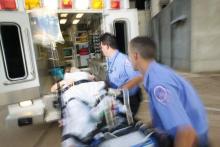Patients who experience a heart attack outside of the hospital are more likely to survive and have better neurologic function when they receive basic rather than advanced life support, according to a recent study.
Emergency medical services respond to an estimated 380,000 cardiac arrests outside of the hospital each year, but 90% of these patients do not survive to hospital discharge, noted Prachi Sanghavi and her associates at Harvard University, Cambridge, Mass.
“Our study calls into question the widespread assumption that advanced prehospital care improves the outcomes of out-of-hospital cardiac arrest relative to the care following the principles of basic life support, including rapid transport and basic interventions such as effective chest compressions, bag valve mask ventilation, and automated external defibrillation,” the authors wrote (JAMA Intern. Med. 2014 Nov. 24 [doi:10.1001/jamainternmed.2014.5420]). Advanced life support involves use of interventions such as endotracheal intubation, intravenous fluid and drug delivery, and semiautomatic defibrillation.
From among more than 4 million emergency rides to the hospital billed under Medicare, the authors analyzed 31,292 involving cardiac arrest where advanced life support was provided and 1,643 cardiac arrests where basic life support was provided. All cases occurred in nonrural counties.
They found 13.1% of those receiving basic life support and 9.2% of those receiving advanced life support survived to hospital discharge. Similarly, 8% who received basic life support and 5.4% who received advanced life support survived to 90 days.
Neurological functioning was also superior in those receiving basic rather than advanced interventions: 21.8% who received basic life support had poor functioning, compared with 44.8% of those who received advanced life support.
“Mean medical spending was higher among beneficiaries receiving basic life support ($11,875 for BLS vs. $9,097 for ALS), in part because individuals who received basic life support survived longer and had more opportunity to receive medical care,” the authors reported.
The study was funded by the National Science Foundation, the Agency for Healthcare Research and Quality, and the National Institutes of Health. A coauthor, Joseph P. Newhouse, holds equity in and is a director at Aetna.

